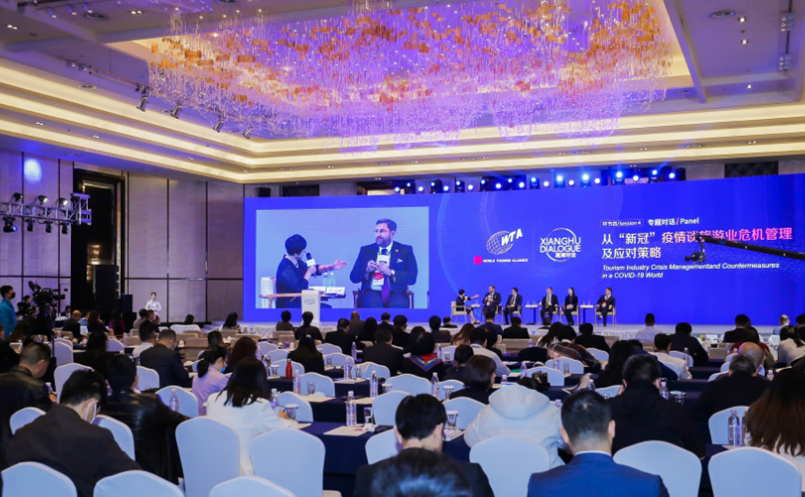Tourism elites seek a way out for the industry
- By Zhang Rui
 0 Comment(s)
0 Comment(s) Print
Print E-mail China.org.cn, November 21, 2020
E-mail China.org.cn, November 21, 2020

A tourism summit was held during Nov. 13 - 14 in Hangzhou, Zhejiang province, where the industry's elites gathered in person and remotely to explore the global challenges and opportunities posed by the unprecedented COVID-19 pandemic.
The third annual WTA•Xianghu Dialogue, with the theme of "Shaping the Future: Rebuilding Confidence & Embracing the New Normal in Travel & Tourism," was organized by the World Tourism Alliance (WTA), in response to the call for an actionable, clear cooperative path forward as the world navigates the pandemic era.
"Currently, the pandemic is effectively controlled in some countries including China, but from a global perspective, it is still spreading and raging. This means the development of global tourism is still facing severe challenges," Zhang Xu, Chinese vice-minister of culture and tourism, said at the event.
He believed multilateralism can deepen international tourism cooperation, and accelerate the recovery and revitalization of the world tourism industry.
He emphasized that to push forward the recovery and revitalization of world tourism, the global tourism industry must unite and help each other, while jointly promoting the sustainable and healthy development of the industry.
Liu Shijun, secretary-general of the WTA, echoed the call, "This is our message: As long as we have firm confidence, uphold cooperation, and seek a win-win situation, the international tourism industry will surely get out of the downturn and achieve revitalization."
Zurab Pololikashvili, secretary-general of the World Tourism Organization (UNWTO), said that the pandemic has hit the tourism industry hard, but the industry has never been so united. "This crisis has made us realize that just maintaining global tourism management is not enough. Sustainability will be at the core of all our work."
Sun Jie, CEO of Ctrip, one of China's largest online travel agencies, proposed to empower "smart tourism" with "digital infrastructure," which can promote the transformation and upgrading of the cultural tourism industry. She suggested a smart cloud platform for scenic areas, and that key scenic areas and museums could be digitized. Meanwhile, tourist destinations should build big data and intelligent application platforms to help, serve and analyze tourists and the market.
China's domestic tourism industry, which was stalled due to COVID-19, has returned to normal and is now injecting confidence into the global recovery of the industry, according to a report released by the WTA and China Tourism Academy on Nov. 13.
Rita Marques, secretary of state of tourism for Portugal, emphasized that coordination and cooperation between countries is vital for the development of tourism. "We must first strengthen cooperation in order to reach a clear and coordinated approach on removing travel restrictions and establishing air route corridors. Otherwise, the economic and financial viability of the tourism sector may be jeopardized. We also need to establish specific information channels to obtain and recognize different methods. We need to be as humane as possible to ensure the standards and procedures for the continuation of international travel," she said.
Figures from the UNWTO show that since early this year, global tourism experienced a dramatic drop. In April, 96% of the world's tourist destinations implemented travel restrictions, of which 90% closed their borders completely or partly. As of July 30, 53% of countries had closed their borders completely or partly. The number of inbound travelers to global destinations fell sharply by 50% from January to June. Asia took the heaviest blow, with inbound travelers down 75%.
Marques asked to launch a mobility policy that is in line with the World Health Organization (WHO), which allows for international travel in a time of crisis. She stressed the tourism development model must be based on the principle of sustainability and practice sustainable development.
Duan Qiang, chairman of the WTA, said tourism is a sunrise industry that meets people's needs for a better life. "As long as we strengthen our confidence, work together, cooperate and win-win, we will contribute to the development of the global tourism."
"When we look to the future of tourism, we hope to be able to rebuild a better global tourism economy. As the tourism industry enters a new stage, we should learn the lessons from 2020.Learning from each other is more important than ever. We must not only be super interconnected, but also rely on one another," said Pansy Ho, the chairwoman of the Global Tourism Economy Research Centre (GTERC) and the vice-chairwoman & secretary-general of the Global Tourism Economy Forum.






Go to Forum >>0 Comment(s)